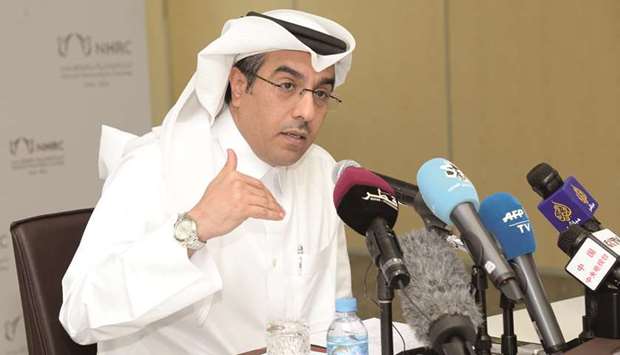National Human Rights Committee (NHRC) chairman Dr Ali bin Smaikh al-Marri has said his efforts to ease the humanitarian impact of the blockade on Qatari and other citizens have been “rebuffed by human rights groups in neighbouring Arab Gulf states”.
The NHRC chairman disclosed in Doha yesterday that he had sent letters to his counterparts in Saudi Arabia, the UAE and Bahrain asking them to appeal to their governments to spare Gulf citizens the humanitarian, social and economic consequences of the dispute, Al Jazeera said.
“We either got no response or have been attacked by our colleagues working on human rights issues in the blockading nations,” he said, adding that the human rights sections in the Arab League, the Organisation of Islamic Co-operation, Arab Parliament and Gulf Co-operation Council have also ignored his plea.
Further, Dr al-Marri said the Saudi government was putting obstacles for Qatari citizens who wished to perform the Haj pilgrimage this year despite its statement to the contrary. “The Saudi government is inciting its citizens against Qataris. The government of Saudi Arabia should have a clear and open stance with regards to permitting Qataris to perform the Haj in Makkah this year without any hindrance,” he said.
Qatari pilgrims faced hurdles and harassment during Umrah, the official observed, with some of them being expelled from different places in Makkah in addition to the cancellation of their bookings. He said companies managing Haj tours have also confirmed that they were facing difficulties.
The NHRC chairman outlined his international efforts to explain the humanitarian impact of the blockade to various United Nations (UN), European and American parliamentarian and human rights groups. “There was great interest and positive responses in the Western capitals we visited,” he noted.
He also said legal action would be taken against the blockading countries on behalf of citizens who filed official complaints seeking financial and economic redress.
The NHRC estimated that 8,254 Saudi, 784 Emirati, and 2,349 Bahraini citizens lived in Qatar. All of them were forced to leave their jobs or face punishment and legal consequences by their governments, he said.
Dr al-Marri urged the Qatari government to work on securing adequate compensation from the blockading countries for Qatari citizens who have paid a high social and economic cost.
Meanwhile, the official called on the relevant entities in the country to approach the International Court of Justice for its advisory opinion on the illegality of the blockade and human rights violations. The court had earlier given a similar opinion on the illegality of the barrier in Palestine. Such an opinion would help ease procedures for Qatar in international courts against the blockade, he added.
He said an international delegation of writers and lawyers is scheduled to visit Doha on Saturday to meet the victims of the blockade and prepare a report on human rights violations. Besides, a delegation from the Office of the UN High Commissioner for Human Rights is also expected to arrive in Doha on Sunday, in addition to a visit by a delegation of European parliamentarians.
Regarding expatriates who worked for Qataris and are now stranded in Saudi Arabia, the official said he has met with the ambassadors of India, Pakistan and Bangladesh to discuss the issue and seek a resolution. The Qatari employers were not able to transfer their salaries, he noted.
Dr al-Marri explained that as the Qatari employers were unable to help the workers due to the blockade, he asked the ambassadors to help resolve the issue in co-ordination with the envoys of their countries in Saudi Arabia. The NHRC has received some 446 complaints from Qataris who have workers and property in Saudi Arabia, he added.

Dr Ali bin Smaikh al-Marri speaking at a press conference in Doha yesterday. PICTURE: Thajudheen


